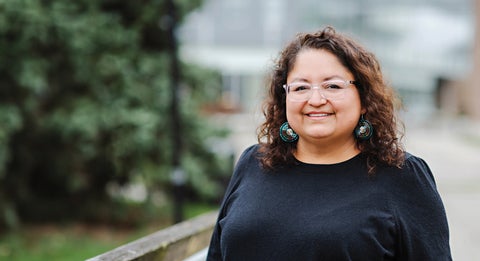Waterloo Magazine
Inside Spring 2024: Happiness
In this issue, we explore the people, policies, innovations and insights that are helping to create a world where happiness and well-being are possible for everyone
Mehndi Boy: The courage to be your true self
Zain Bandali (BES ’20) publishes an early-reader chapter book that explores gender norms and sense of belonging in a community
The science of happiness
First-year students hone more than their research skills by exploring what it means to be happy
Unlocking human potential through a universal basic income
Floyd Marinescu (BMath ’02) launched UBI Works to reframe the debate about basic income — and his message is catching on
Roadblocks that lead to beautiful destinations
Chris Wilson (BSc ’21) charts an unconventional course to live a life with curiosity and without regrets
Adapting with intent
Simon Chan (BA ’98) identifies three key stages to navigating the non-financial aspects of retirement

"Who we are as an institution starts with our people —our alumni, students, staff, faculty and partners. As Waterloo’s history attests, when we listen, collaborate and act, we achieve great things. Together, we won’t stop seeking ways to create a happier and healthier world."
— Vivek Goel
President and Vice-Chancellor, University of Waterloo
ALSO IN THIS ISSUE
Finding Indigenous community →
Robin Jones-Stadelbauer (BA ’12, BA ’22) shares how her experience as an Indigenous student inspires her current leadership role in Waterloo’s Office of Indigenous Relations
Meet the entrepreneurs and innovators advancing happiness →
Explore the journeys of Waterloo changemakers as they build community and forge progressive solutions
A mission to create a better future →
World-class researchers shape new ways to foster happiness and personal well-being
Sharing in the good times →
Engineering traditions that create community, make memories and forge friendships that will last a lifetime
Waterloo changed my life in unexpected ways →
Gil Aburto-Avila (MMath ’70) shares why he moved from Mexico to study at the University of Waterloo and why he gives back as an alum
More than a credential or piece of paper →
Sara Konrath (BA ’02) has followed an unlikely career path that now inspires her to give back
CLASS NOTES
Clear Blue Technologies, co-founded by chief executive officer Miriam Tuerk (BASc ’85), was named to Corporate Knights’ 2023 Future 50 list.
Dr. Mike Wulder (MES ’96, PhD ’99) was appointed as a member of the Order of Canada for his internationally recognized innovations in the field of remote sensing for mapping and monitoring land cover.
Monica Singh Soares (BA ’05), founder of Rise Up and Soar Community, was the first South Asian to be elected to council at the Township of Southgate.
SPATULA Foods, co-founded and led by chief executive officer Ian Weng (BAFM ’13, MAcc ’13), appeared on Dragon’s Den, receiving offers from all five dragons.

In memoriam
Commemorating alumni who have died

Talk of the campus
Thank you Dominic Barton
ARCHIVES

Fall 2023
PDF Edition

Spring 2023
PDF Edition

Fall 2022
PDF Edition

Spring 2022
PDF Edition
Subscribe to Waterloo Magazine →
Update your subscription preferences











